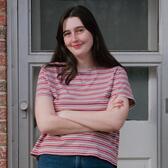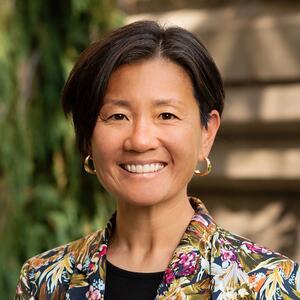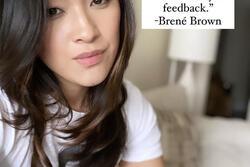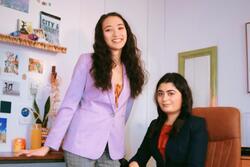7 Questions For Helen Kim
JWA chats with sociology professor and author Helen Kim.
JWA: You are the co-author, along with your husband Noah Leavitt, of JewAsian: Race, Religion, and Identity for America’s Newest Jews, a book exploring your family’s multi-ethnic identities. Why the adjective “newest” Jews?
Helen Kim: The term “newest” Jews actually came from a Contemporary Jewry article we wrote titled, “The Newest Jews? Understanding Jewish American and Asian American Marriages.” The question mark in this title is really important, because we were asking whether or not they are, in fact, “new.” The question was a rhetorical one: JewAsians aren’t “new”— they just had not, at the time, been given attention, especially as a group of individuals that includes Jews of color. So, we wanted to call attention to this absence by using a word like “newest” as one that might be highly debatable.
JWA: What are some of the joys that come with raising a family in both Jewish-American and Korean-American cultures?
HK: Gosh, there are so many joys. I think the joys come from the tensions that often arise and how we navigate these. For example, I find that there are distinct differences in communication styles, and figuring out how we meet in the middle between two cultural ways of being, say, during our regular dinnertime conversation is a challenge and a joy.
I think another joy is seeing both of our kids sometimes reject, sometimes question, and oftentimes embrace both cultures through vehicles such as text-based learning, stories, food, and other kinds of material culture.
JWA: Are there any similarities between Jewish and Korean traditions that might surprise people who are not familiar with both?
HK: The one that most immediately comes to my mind is the similarity between the Korean holiday, Chuseok, and Sukkot. They are fall festivals that are determined by the lunar calendar. Both centralize the concept of home and dwelling.
While it might be passé to say this, the emphasis on particular foods is a similarity between Jewish and Korean traditions, as is the case for many cultures. And these foods tie individuals and people to their histories and their stories. For example, the place of kimchi in Korean food culture and pickled vegetables in Jewish food culture. The prominence of these kinds of foods and many others speak to traditions that are rooted partially in geography, partially in economic standing, partially in safety, and partially in weather.
JWA: In an essay for the Jewish Book Council, you mention that your two children, Ari and Talia, “challenge us every day” and were an inspiration for your research. Are there any insights your children have taught you that still guide you, or questions you’re still seeking answers to?
HK: I think that our children are asking us to be unafraid in giving us as many opportunities as possible to be full humans in this world. I will admit that I still seek out the “right” way to instill a sense of Korean identity in my children. This is harder to do than instilling a sense of Jewish identity for me. One thing that we learned from the adult children we interviewed for our book was their strong suggestion to parents that they be unafraid to give their children everything and that they will eventually figure things out. I am trying to do this with my own children. Sometimes it feels as though I am not doing enough or am doing the wrong thing, but I think this is just the way that parenting and loving another human being, especially your own child, works.
JWA: Was Judaism present in your life before you met your husband? Do you remember your first impressions of Jewish life?
HK: Judaism has definitely been present in my life pretty much from the get-go. My first crush when I was four years old was on a nice Jewish boy in kindergarten. While this was unrequited love, through him and through other Jewish friends, I was exposed quite a bit to Judaism, Jewish identity, and Jewish community. I was always impressed by how my Jewish friends never shied away from a minoritized identity and actually embraced it fully. It was something that I was craving and learning how to do as a racially Asian person growing up in a predominantly white neighborhood, and I saw my Jewish friends as role models.
JWA: You currently teach and research sociology at Whitman College. What drew you to this field of study?
HK: Sociology held all of the answers to the questions I was asking myself in college and beyond. I was very interested in how groups of individuals act in the way that they do and how these actions and behaviors change depending on time and context. While I'm not actively researching and teaching at the moment, I find that sociology still has the answers to so many questions that I still have and will probably always have.
JWA: Are you currently involved in any research, related to Judaism or otherwise?
HK: I just worked on a piece on allyship between Jewish Americans and Asian Americans as part of a study on allyship spearheaded by Jeffrey Herbst, president of American Jewish University. This piece will be published alongside other similar pieces soon. I think this work is so timely to the historical moment we are in.








I loved this article. My daughter-in-law is half Vietnamaese. She, too, has adopted the Jewish culture. It's all fascinating!